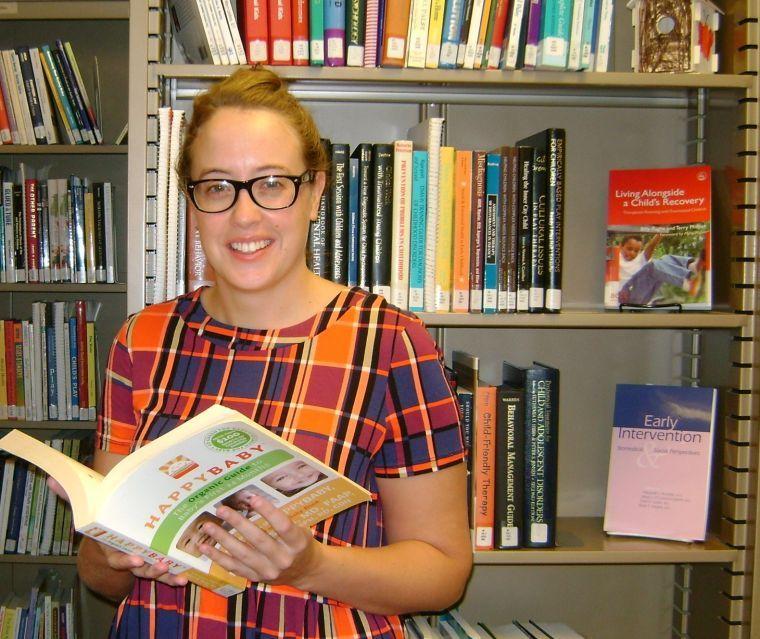Doctoral student receives Doris Duke fellowship
Catherine Corr, graduate student, is the first student from the Urbana campus to receive a fellowship from the Doris Duke Charitable Foundation.
April 2, 2014
The Doris Duke Charitable Foundation has awarded their fellowship for the promotion of child well-being to doctoral student Catherine Corr.
Not only is this the first time that the fellowship has been issued to a student from the Urbana campus, but it is also the first time it has been given to a candidate in Corr’s area of study. The fellowship comes with a $25,000 stipend to be used by the recipient to help complete their dissertation and research.
Corr, a doctoral candidate in special education, also possesses a bachelor’s degree in elementary education from the University of Iowa, as well as a master’s degree in early childhood special education from the University of Illinois. Her dissertation focuses on researching new early intervention programs for care providers and child protection service workers to help them better treat and service children with disabilities, who have also been abused.
“I’m really honored to have received this award,” Corr said. “I’ve had a lot of great mentors, including my family and my academic advisors who … have really, really challenged me and supported me to follow my interests. I’m excited to pursue my research as well as hopefully improve services for families and children.”
Growing up, Corr was exposed to the field of special education by two of her aunts who worked with adults with disabilities. In high school, she discovered her passion for helping disabled children while working for the Chicago Park District as a therapeutic recreation leader.
Get The Daily Illini in your inbox!
Corr began to focus her attention on disabled children who were also victims of abuse while working for the Champaign County Court Appointed Special Advocates for Children, or CASA.
During this time, Corr said she noticed that service systems, like the juvenile justice system and volunteer-run care programs for abused or disabled children, were often working with the same child. However, none of these services possessed professional expertise in both child maltreatment and disability care. She found that many disabilities were going undiagnosed or that volunteers working with the children were not knowledgeable about their specific disability.
In addition to the Doris Duke Fellowship for the Promotion of Child Well-Being, Corr was named the corecipient of the 2013-2014 Campus Award for Excellence in Public Engagement in early March for helping to provide training and support for volunteers while at CASA.
“I feel really lucky,” Corr said. “I’ve been involved in a couple of really great projects, this just seems to all be culminating at one point.”
Founded in 1996, the Doris Duke Charitable Foundation has given out over $1 billion in grants to both individuals and organizations in six categories, including arts, environment and medical research. The Fellowship for the Promotion of Child Well-Being looks to help finance candidates working to create new policies and practices that serve to prevent child abuse, as well as help child development.
If chosen, candidates must choose two mentors to assist them in both policy and academics. Corr selected special education Professor Rosa Santos as her academic mentor for the fellowship and Director of the Illinois Early Intervention Training Program Ted Burke as her policy mentor.
To apply for the fellowship, Corr was required to submit an eight-page document detailing her dissertation, research questions, methodology and how she planned to disseminate her information.
To tie off her application, Corr provided letters of support from the head of her department, her academic and policy mentors and a person familiar with her professional work. The entire process took around six months to complete, Corr said.
Both of Corr’s mentors expressed their pride in her success.
“I was so excited for her,” Santos said, describing her reaction to Corr’s award. “She’s one of the stars in our program right now.”
Burke noted that the fellowship has never been given to a special education doctoral student.
“It will really help us train (workers in) the field, so we’re really looking forward to some good data that will help us develop curriculum,” Burke said.
Corr hopes that the publicity brought by the fellowship will bring more attention to disabled and abused children. She also hopes it will lead to more people developing an interest in special education, which she described as being an ever-changing field full of challenges but with fantastic rewards.
“This area of young kids with disabilities who have been abused is an area that needs to be addressed more by the public,” Corr said. “I’m hopeful with the increase in attention, there will be more support for professionals who work with these children as well as more support for families who experience these issues.”
Joshua can be reached at [email protected].







